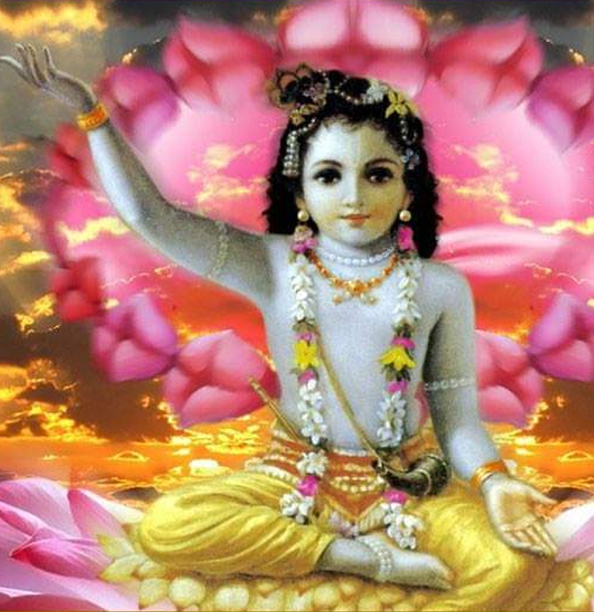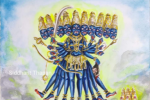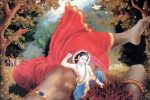NAME 74
Īśvaraḥ ईश्वरः
Nāma 36 is also Īśvaraḥ, which described Him as the master of the universe.
Īś means to possess and vara means to reward. He possesses the capacity to reward His devotees. Brahman alone has the capacity to reward whatever is prayed for. If devotees ask for wealth, He gives them wealth. If they ask Him for liberation, He gives them liberation. However, He gives subject to the law of karma. Though He gives, they get fructified only when the law of karma is ripe for its fructification. This is the reason for most of our prayers not being answered spontaneously. The life principle is based on the fact that what is sown is only reaped.
Even though the same nāma is repeated twice, both of them convey different meaning.
One who is Omnipotent, and so has all powers in Him to the full. The manifested powers of Life express themselves in every intelligent man as the power of action in the body (Kriya Shakti), the power of desire in the mind (Ichha Shakti) and the power of knowledge in the intellect (Jnana Shakti). All these three powers are manifestations of Him, and since He is the One everywhere, He is the total mighty power-the Great Vishnu.
Ishvarah – He is Omnipotent
This Nama first appeared in 4th shloka. “Sambhavo bhaavano bhartaa prabhavah prabhur Ishvarah….” as the 36th naama.
The current occurrence is interpreted by Sri Adi Sankara as ‘Sarva Shaktimattayaa Ishvarah – He is Ishvara because he is all powerful. In this verse Ishvarah is explained as – the one who has unlimited powers with enormous self-control and gets whatever HE ‘Wills‘.
७४. ॐ ईश्वराय नमः |
74. OM Īśvarāya Namaḥ
Īśvaraḥ -One who is Omnipotent, and so has all powers in Him to the full. The manifested powers of Life express themselves in every intelligent man as the power of action in the body (Kriyaa Sakti), the power of desire in the mind (Icchaa Sakti) and the power of knowledge in the intellect (Jnaana Sakti). All these three powers are manifestations of Him, and since He is the One everywhere, He is the total mighty power-the Great Vishnu.
Sarvaśaktimān The Omnipotent. So called as he possesses infinite power.
Śvetāśvataropaniṣat – Chapter 6
Ta mīśvarāṇāṃ paramaṃ maheśvaraṃ taṃ devatānāṃ paramaṃca daivataṃ,
Patiṃ patīnāṃ paramaṃ parasta dvidāma devaṃ bhuvaneśa mīḍyam. (7)
:: श्वेताश्वतरोपनिषत् – षष्ठोऽध्यायः ::
त मीश्वराणां परमं महेश्वरं तं देवतानां परमंच दैवतं ।
पतिं पतीनां परमं परस्त द्विदाम देवं भुवनेश मीड्यम् ॥ ७ ॥
He who has contained in Himself the highest divinity, the great Lord, the Supreme Deity of deities, the master of masters, who is higher than the imperishable Prakr̥ti and is the self-luminous; let us know that God as the most adorable Lord of the world.
INTERPRETRATION GUIDED BY SANT VANI (WORDS OF SAINTS)
Īśvaraḥ (also name 36)
The omnipotent.
He who is the master of the entire Universe. The Omnipotent, Omniscient, Omnipresent one who is ‘unlimited’ and holds complete sway over the entire universe. The one without beginning or end – the undisputed supreme master of Universe of Supreme Bliss.
Lord Viṣhṇu is called Īśvara, sarva–śaktimattvāt, because He possesses infinite power. He is the one who is qualified to be called ‘the Lord’ because of His omnipotence, limitless power, because He has the overlordship.
For how long is this lordship? The Lord is always Īśvara by nature, possessing all power. His tenure does not change and he need not stand for election nor does his lordship depend on opinion polls. Because we are connected to him and are pervaded by this power, we are also endowed with iccha śakti – the power to desire, Kriya śakti- the power to act and jñāna śakti-the
power to know. What a privilege to have these powers, in every single situation!
Our response in every single situation is a combination of all these powers. It is our response that frees us from the limitations of every situation.
This name occurred earlier as name #36 and repeats again here as name #74. In the entire Viṣṇu Sahasaranama, 90 names occur twice or more. Commentators include names that are exact repetitions: Viṣṇu–Viṣṇu, Śiva–Śiva, Īśvaraḥ–Īśvaraḥ and those that have same or similar meanings. Based on this:
74 names occur twice
14 names occur thrice
2 names occur 4 times
As we have seen, the names in the Viṣṇu Sahasaranama are not strung together at random – there is a specific order and reason why they are repeated. This is one of several benefits of approaching the Sahasaranama, one name at a time.
These names that are repeated are specifically “gateway-names” – Gates that open up to names that either specifically talk about the greatness of that Supreme Being or are names that are ideal for contemplation and meditation and help open up the gateways to higher meditative states. For example after Īśvaraḥ appears as name #36, the names that are strung together are all names that further qualify that Īśvaraḥ – he is Svayambuḥ (स्वयम्भूः), Śambhuḥ (शम्भु:), Āditya: (आदित्य:) and so on. We will see that similarly after name 74 which is again Īśvaraḥ the names that are strung together are all names that again further qualify the name of Īśvaraḥ and provide us with a sense of awe and splendor of that Supreme Being. Interestingly, this comes soon after a string of names that makes us feel that the Supreme Being is our friend, the elder brother, the Guru, and the compassionate one who will help and guide us in our journey.
As the Bhagavad-gītā confirms [Chapter-10; verse-03]
यो मामजमनादिं च वेत्ति लोकमहेश्वरम् |
असम्मूढ: स मर्त्येषु सर्वपापै: प्रमुच्यते || 10-3||
yo māmajam anādiṁ cha vetti loka-maheśhvaram
asammūḍhaḥ sa martyeṣhu sarva-pāpaiḥ pramuchyate
Those who know me as the unborn (ajam) and one without beginning (anādiṁ), that Supreme Lord of the universe (loka-maheśhvaram), they among mortals (martyeṣhu) are free from illusion, delusion and (thus) released from all bondage.
The five manifestation of Viṣhṇu as Īśvaraḥ according to the Pāñcharātra Śāstra are:
Para — That Supreme transcendental being from whom all others emanate.
Vyūha — The four manifestations:Vāsudeva, Saṅkarṣaṇa, Pradyumna and Aniruddha;
Vibhava — Incarnations which appear from time to time to rectify and restore harmony and balance to the universe, such as Rāma, Kṛṣṇa, etc.
Antaryāmin — the in-dwelling controller of all.
Arcā-avatāra — the consecrated Murtis/Vigrahas that are Sannidhis of “his” divine śaktí
The previous name Madhusūdanaḥ, completed the 8th string in the Viṣhṇu Sahasaranama containing 10 beads and the total number of names covered in those eight strings is 73.



